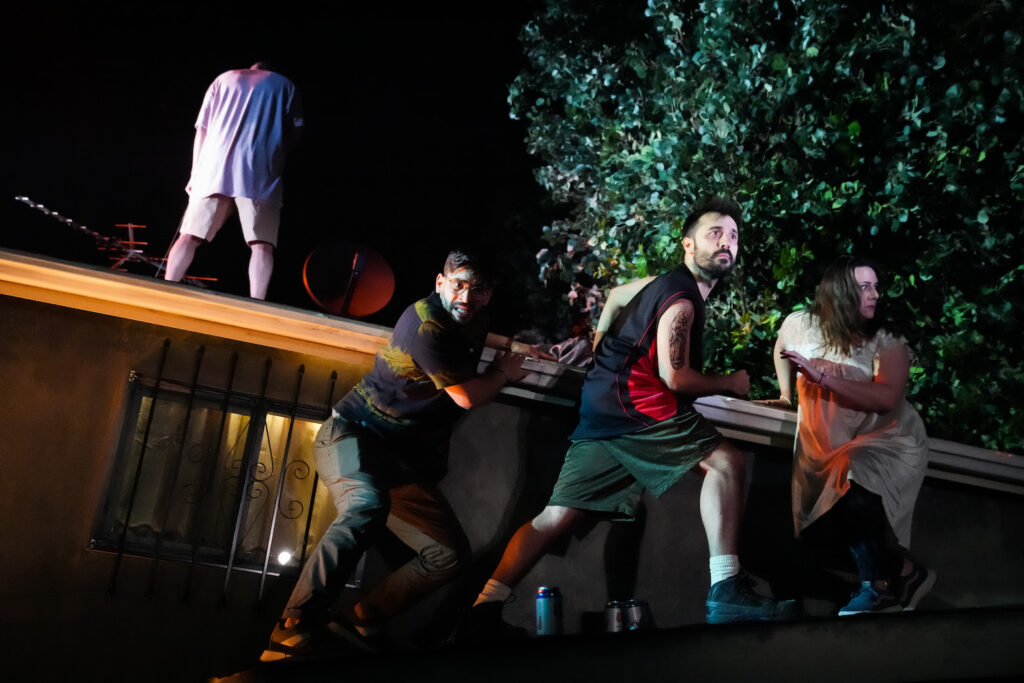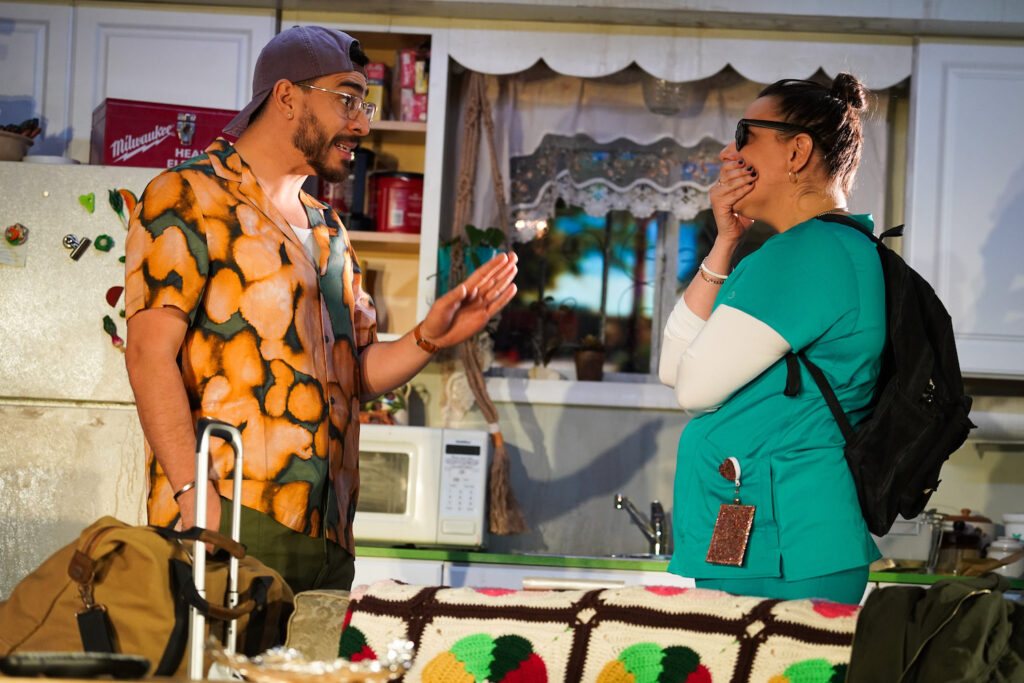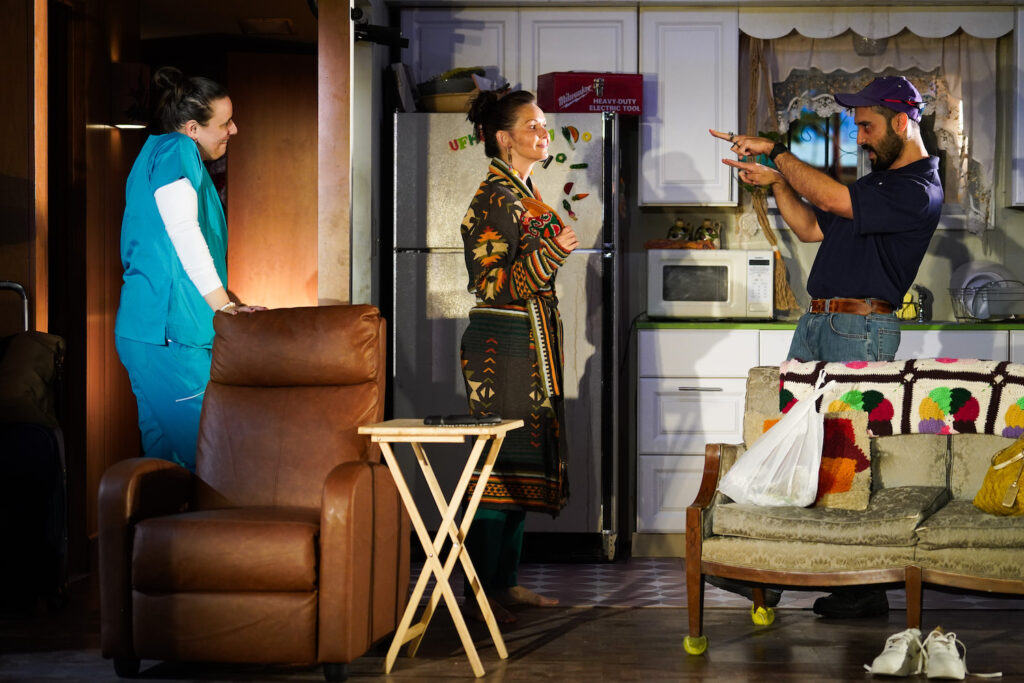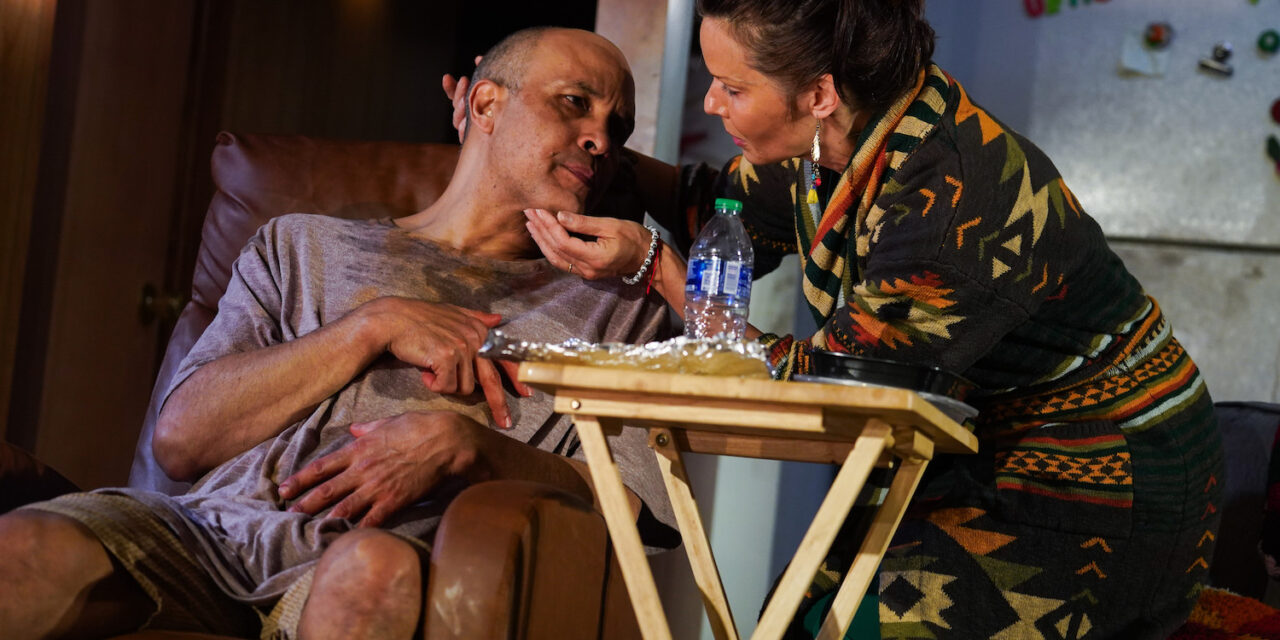By Samuel L. Leiter . . .
I’m sure most people would agree that, even if they have no idea of what Wet Brain Syndrome is, it makes a more intriguing play title than Wernicke-Korsakoff [or Korsakoff’s] Syndrome, the technical term for the same thing. On the other hand, the dialogue in Wet Brain, John J. Caswell, Jr.’s, less than satisfying new play at Playwrights Horizons, about someone suffering from the syndrome, uses the longer term but never its more ordinary version.
In the play, Angelina (Ceci Fernández), a nurse in training, defines the condition as “Wernicke’s encephalopathy, Wernicke’s psychosis. Caused by extreme alcoholism and a lack of thiamine.” The play itself is essentially a case study of a mortally ill alcoholic, depicted with a combination of clinical exactitude and artistic liberty.

Based partly on autobiographical experience—see Caswell’s program note addressed to his dad—Wet Brain is a family drama, with a string of laugh lines lightening the depressing circumstances. Three siblings gather in a shabby Scottsdale, Arizona home to decide how to handle the problem of their father’s deteriorating health. Ron (Frankie J. Alvarez), who works with the patriarch, Joe (Julio Monge), at their auto body shop, previously donated a kidney to him; Ricky (Arturo Luís Soria), who’s gay, has flown in from his well-paid executive position at a corporation hours away; and Angelina, who’s studying for a nursing degree in gerontology, thinks Ricky, who hasn’t been there in six years, could be doing more for their dad. All have histories of substance abuse, although Ricky and Angelina have been on relatively good behavior while Ron hides beer cans in the toilet tank.
The siblings, ostensibly loving one another, are often at each other’s throats. Ron plays off his macho temperament—despite Angelina signaling that his impotence led his girlfriend to leave him—by being aggressively homophobic toward his brother. Angelina, who’s also dealing with eating issues (she and her brothers nourish themselves on burritos and cold pizza), may herself lean toward same sex attraction in her relationship with Crystal (Florencia Lozano), a health care aide eventually hired to assist with Joe’s care.


Joe is a physical and mental mess, barely able to stand up straight, peeing on the floor, and incapable of coherent speech, although he has an affinity for “singing” MC Brain’s 1991 rap hit, “Oochie Coochie Ooh-La-La.” A final twist in the family’s dysfunctional cocktail is the suicide of Mona (Ms. Lozano, again), who hanged herself from the ceiling fan when the kids were little, but whose presence is a constant in everyone’s traumatized psyche.
Caswell, perhaps feeling the need to gussy up what, even with its clinical details, is yet another in a long line of plays about screwed up families struggling with booze or drugs—and not a particularly unique or effectively plotted one at that—has made some choices that attempt to raise its existence to another level. One concerns its appearance, for which Kate Noll has designed a naturalistic house, usually displaying a kitchen-living room-hallway interior, placed on a revolving stage, before a looming backyard tree; at several points it moves several feet this way or that to show the space from slightly different angles. These shifts serve little purpose, though, while another, which moves the action to the roof, where the family congregates, offers a striking visual change.
Most spectacular is a scenic revelation tied to the play’s surrealistic, sci-fi subplot, which—at several earlier points highlighted by lighting and sound effects—attempts, albeit ambiguously, to explore the world of Joe’s diseased imagination by suggesting (I think) that he’s actually an alien from outer space. In an outlandish, otherworldly scene toward the end, he, along with the family and various household artifacts (a record player, a couch, chairs, etc.), are shown floating in space by spreading them, like pinned butterflies, over a large vertical panel. Their interstellar journey is in the hands of the now perfectly articulate Joe, joined by his suicided wife, Mona, casually hanging from a ceiling fan but very much alive. The couple’s mission, it would seem, is to reflect, bizarrely, on their parental failings, Mona’s suicide in particular. Meanwhile, the kids contemplate their frustrating inability to feel anything when they should be furious with anger.


Combined with some dazzling lighting effects by Cha See and projections by Nick Hussong, with exciting sound design by Tei Blow and John Gasper, this weird scene, depressing as it is, might alone be worth the price of admission were it not so radically intrusive, distracting from everything around it. It should certainly not be what you remember best.
Dustin Willis, who recently codirected the NAATC’s misguided Romeo & Juliet does a bit better here, but he often lets his actors shout their brains out, especially Frankie J. Alvarez, playing too many scenes for immediate effect rather than honest human connection. Ceci Fernández manages to give the most convincing performance in this overheated goldfish bowl. Julio Monge’s Joe, a bundle of broadly depicted traits associated with the titular syndrome, is eye-catching, but he never cracks the believability standard. Not, at least, if you’re familiar with Andrea Riseborough’s startling performance as a nearly wasted drunk in To Leslie.
Wet Brain contains a substantial amount of lively, colloquial dialogue, some of it worthy of a soft chuckle or two, and a number of its interchanges smack of emotional authenticity. But its often overwrought acting and uncomfortable mingling of gritty naturalism and fantastical confession throw a wet blanket on a work that should make one feel more deeply than this one does for its largely unsympathetic characters’ dilemmas.
Wet Brain. Through June 25 at Playwrights Horizons (416 West 42nd Street, between Ninth and Tenth Avenues). www.playwrightshorizons.org
Photos: Joan Marcus
Cover Photo: Julio Monge, Florencia Lozano


















